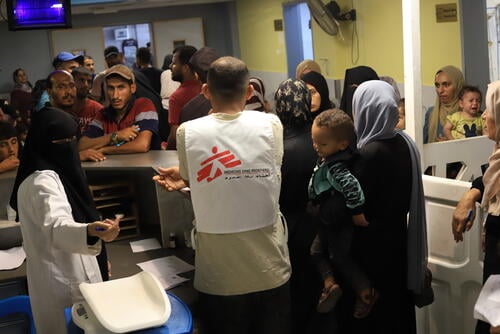Jerusalem – In Khan Younis, southern Gaza, Palestine, fighting is approaching ever closer to Nasser hospital, putting it under threat and jeopardising people’s access to medical care. This comes as Médecins Sans Frontières (MSF) teams at Nasser and Al-Aqsa hospitals have responded to 10 mass influxes of badly injured people in July alone, following bombings in the area. MSF urgently calls on all warring parties to ensure people’s safe access to medical care and to avoid the evacuation of Nasser hospital, which would endanger hundreds of patients.
“Any escalation of fighting near the hospital would obstruct access for patients and medical staff, making it impossible to provide care,” says Jacob Granger, MSF project coordinator in Gaza. “The health system is completely decimated and evacuating hundreds of patients and medical supplies, hastily or not, would be an impossible task.”
“It would have devastating consequences for people in the area, who have nowhere else to go,” says Granger. “Closing Nasser hospital is not an option.”
Any escalation of fighting near the hospital would obstruct access for patients and medical staff, making it impossible to provide care.Jacob Granger, MSF project coordinator in Gaza
Nasser hospital is providing care for an estimated 550 patients, including people with severe burns and trauma injuries, newborns, and pregnant women. People currently admitted in the hospital need continuous, lifesaving treatment, including those who require a high level of care, oxygen therapy, or close monitoring. As the last main hospital in southern Gaza, Nasser hospital also provides essential support, including oxygen production, to several other health facilities in the surrounding area.
The encroaching war on Nasser hospital comes as MSF teams in Nasser and in Al-Aqsa hospitals have been flooded by massive numbers of wounded patients arriving at the same time. In July alone, this has occurred on 10 separate occasions, following strikes and fighting, often in areas where displaced people are sheltering.
“Every day in July has been one shock after another,” says Dr Javid Abdelmoneim, MSF medical team leader. “[On 24 July] I walked in behind a curtain, and there was a little girl alone, dying by herself. And that’s the outcome of a collapsed health system: a little eight-year-old girl, dying alone on a trolley in the emergency room. In a functioning health system, she would have been saved.”
The situation was desperate: even the most dedicated response can’t always save lives without enough supplies, beds, and medical staff.Alice Worsley, MSF nurse activity manager
According to the Ministry of Health, levels of blood in the blood bank at Nasser hospital are critically low after five successive waves of incoming patients, with around 180 people killed and 600 injured. One in 10 people who volunteered to give blood during an MSF supported Ministry of Health blood collection activity, were unfit to donate due to anaemia or malnutrition. In Al-Aqsa hospital, the emergency department hasn’t been able to function properly as it is overwhelmed with patients. Before the war, Al-Aqsa hospital had some 220 patients beds. Currently, the hospital has 550 – 600 patients admitted.
“Al-Aqsa hospital is already several hundred patients over its bed capacity,” says Alice Worsley, MSF nurse activity manager. The overcapacity comes after receiving patients from an Israeli strike on Khadija school in Deir Al-Balah on 27 July. “The situation was desperate: even the most dedicated response can’t always save lives without enough supplies, beds, and medical staff.”
On 22 and 27 July, the Israeli forces issued two evacuation orders in Khan Younis, resulting in yet another mass displacement and further shrinking the space where people can go. According to OCHA, from July 22 to 25, approximately 190,000 Palestinians were displaced in Khan Younis and Deir Al-Balah. Since the start of the war, an estimated 1.7 million people have been advised to move to an area of 48km2, representing 13 percent of the Gaza strip, according to the World Health Organization.
While the so-called humanitarian zones have proved to be unsafe in Gaza, the existence of such areas does not take away warring parties’ obligations to protect civilians – wherever they are. For nearly 10 months, we have seen that nowhere in Gaza is safe.
MSF calls on all parties to ensure safe access to care and avoid the evacuation of Nasser hospital, which would endanger hundreds of patients.



